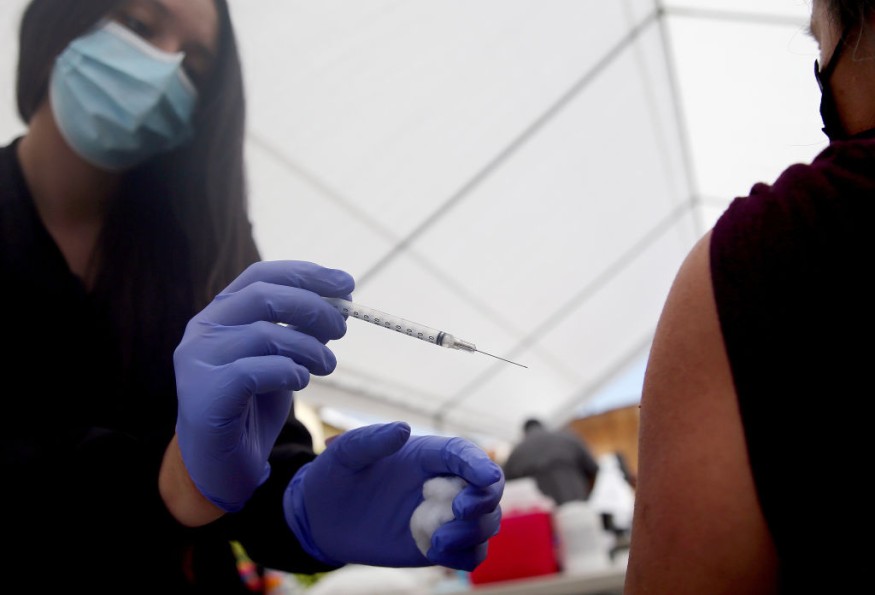Pfizer CEO: Third Dose of COVID Vaccine Likely Needed Within a Year

People would likely need to get a third dose of a vaccine within a year after getting fully vaccinated against COVID-19, according to Pfizer CEO Albert Bourla.
In an interview with CNBC's Bertha Coombs taped on April 1 but was made public on Thursday, the Pfizer CEO added that people might need to get vaccinated against the COVID-19 annually.
Bourla said there is a high possibility that people will need to get a booster dose of a vaccine between six and 12 months after being fully vaccinated.
"Then from there, there will be an annual revaccination, but all of that needs to be confirmed. And again, the variants will play a key role," the Pfizer CEO noted.
Bourla also emphasized the importance of decreasing the number of people that could be susceptible to coronavirus.
The Pfizer CEO's statement came following the comment of Alex Gorsky, CEO of Johnson & Johnson, that the COVID-19 vaccine might need to be administered annually like the seasonal flu vaccines.
According to NBC News, as of the moment, researchers still do not have complete information on the timeframe of the vaccine's protection against the virus after getting fully vaccinated.
COVID-19 Vaccines' Efficacy Rate Over Time
Earlier this month, Pfizer, one of the first biopharmaceutical companies to develop a vaccine against COVID-19, said that its vaccine has an efficacy rate of above 91 percent.
The company added that its vaccine was more than 95 percent effective against severe cases up to six months after the second shot.
Moderna, another company that developed a COVID-19 vaccine using similar technology to Pfizer, said its vaccine is also highly effective within the six-month timeframe.
The data released by Pfizer was based on its study of more than 12,000 vaccinated people. Despite the positive results, the researchers stated that more information is still required to determine the full potential of the vaccine and if the protection against the virus would last for more than six months.
READ NEXT: Shut Your Mouth': Maxine Waters Snaps At Jim Jordan as COVID Hearing With Fauci Gets Heated
Challenges Arise from New COVID-19 Variants
On Thursday, David Kessler, the Covid response chief science officer of the Biden administration, told the House Select Subcommittee on the Coronavirus Crisis that Americans should expect a booster shot to protect them from other variants as well.
Kessler noted that the currently authorized COVID-19 vaccines that have been administered to many are highly effective against coronavirus. However, he said the new variants pose a "challenge" to the effectiveness of the shots.
The COVID response chief science officer also told lawmakers that many things are still unknown at the moment. He said that they are still in the middle of studying the durability of the vaccines' immune response.
A few months back, Pfizer announced that it was already testing a third dose of its COVID-19 vaccine better to understand its immune response against new variants of coronavirus.
Infectious disease specialist of Georgetown University Medical Center Daniel Lucey said that additional doses to boost immunity and target current or future variants would likely be a new reality for many people, National Geographic reported.
Lucey noted that the coronavirus would mutate for its own survival benefit and might escape the current vaccines' protection.
"It's a constant series of battles and multi-year war between SARS-CoV-2, its variants, and our vaccines, which are from 2019... And we're behind. The virus doesn't sleep, but we do," he said in the report.
The U.S. Food and Drug Administration earlier said that it expects any COVID-19 vaccine to prevent disease or decrease severity in about 50 percent of vaccinated people.
WATCH: Pfizer CEO Says COVID Booster Shot Likely Needed Within 12 Months - From NBC Nightly News
Subscribe to Latin Post!
Sign up for our free newsletter for the Latest coverage!

















